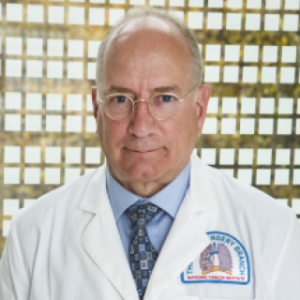
David S. Schrump, MD, MBA, FACS


Dr. David S. Schrump is the Surgical Chief of the Thoracic Surgery Branch of the National Cancer Institute’s Center for Cancer Research. In this role, he oversees clinical and translational research about thoracic malignancies, particularly lung and esophageal cancers and malignant pleural mesotheliomas.[1]
Dr. Schrump pioneered the development of epigenomic therapies for thoracic cancers and has identified novel therapeutic targets for their treatment. He has also demonstrated through clinical trials that chromatin remodeling agents both induce growth arrest and promote immunogenicity of these tumors.[1]
Dr. Schrump’s areas of expertise include chromosome biology, lung cancer, thoracic cancer, cancer epigenetics, esophageal cancer, pleural mesothelioma, and cancer immunology and immunotherapy.
Education and Career
Dr. Schrump graduated from the University of Connecticut School of Medicine and completed his internship and General Surgery residency at the University of Chicago. He also completed a three-year research fellowship in Human Cancer Immunology at Memorial Sloan-Kettering Cancer Center. After completing a Thoracic Surgery residency at the University of Michigan, he was appointed to the cardiothoracic surgery faculty at M.D. Anderson Cancer Center in Houston, Texas.[1]
Four years later, Dr. Schrump was appointed to his current position at the National Institute of Health. He also earned an MBA in Health Services Management from the Carey School of Business, Johns Hopkins University.
Professional Memberships and Activities
Dr. Schrump is a member of the American Association for Thoracic Surgery; the Society of Thoracic Surgeons; the John Alexander Society; the International Association for the Study of Lung Cancer; the Society of Clinical Oncologists; and the American Association for Cancer Research.[1]
Research
As Chief of the Thoracic and Oncologic Surgery Branch of the NCI, Dr. Schrump oversees thoracic surgery interventions in all patients enrolled on NIH protocols. His primary clinical efforts are devoted to the care of patients with lung and esophageal cancers and malignant pleural mesothelioma referred to the NCI for standard multidisciplinary treatment, or investigational therapies.[1]
Clinical Trials Currently Recruiting:[1]
Evaluation of Cell Changes in Blood and Tissue in Cancers of the Lung, Esophagus, and Lung Lining
Selected Key Publications:[1]
Recognition of galactosylgloboside by monoclonal antibodies derived from patients with primary lung cancer. Schrump DS, Furukawa K, Yamaguchi H, Lloyd KO, Old LJ. Proc Natl Acad Sci U S A. 85(12): 4441-5, 1988. [ Journal Article]
Bile acid-induced “Minority MOMP” promotes esophageal carcinogenesis while maintaining apoptotic resistance via Mcl-1. Xu Y, Surman DR, Diggs L, Xi S, Gao S, Gurusamy D, McLoughlin K, Drake J, Feingold P, Brown K, Wangsa D, Wangsa D, Zhang X, Ried T, Davis JL, Hernandez J, Hoang CD, Souza RF, Schrump DS, Taylor Ripley R. Oncogene. 39(4): 877-90, 2020. [ Journal Article]
ASXL3 Is a Novel Pluripotency Factor in Human Respiratory Epithelial Cells and a Potential Therapeutic Target in Small Cell Lung Cancer. Shukla V, Rao M, Zhang H, Beers J, Wangsa D, Wangsa D, Buishand FO, Wang Y, Yu Z, Stevenson HS, Reardon ES, McLoughlin KC, Kaufman AS, Payabyab EC, Hong JA, Zhang M, Davis S, Edelman D, Chen G, Miettinen MM, Restifo NP, Ried T, Meltzer PA, Schrump DS. Cancer Res. 77(22): 6267-81, 2017. [ Journal Article]
Mithramycin represses basal and cigarette smoke-induced expression of ABCG2 and inhibits stem cell signaling in lung and esophageal cancer cells. Zhang M, Mathur A, Zhang Y, Xi S, Atay S, Hong JA, Datrice N, Upham T, Kemp CD, Ripley RT, Wiegand G, Avital I, Fetsch P, Mani H, Zlott D, Li X, Rao M, Schrump DS. Cancer Res. 72(16): 4178-92, 2013. [ Journal Article]
Immunologic Recognition of a Shared p53 Mutated Neoantigen in a Patient with Metastatic Colorectal Cancer. Lo W, Parkhurst M, Robbins PF, Tran E, Lu YC, Jia L, Gartner JJ, Pasetto A, Deniger D, Malekzadeh P, Shelton TE, Prickett T, Ray S, Kivitz S, Paria BC, Kriley I, Schrump DS, Rosenberg SA. Cancer Immunol Res. 7(4): 534-43, 2019. [ Journal Article]

Terri Heimann Oppenheimer
WriterTerri Oppenheimer has been writing about mesothelioma and asbestos topics for over ten years. She has a degree in English from the College of William and Mary. Terri’s experience as the head writer of our Mesothelioma.net news blog gives her a wealth of knowledge which she brings to all Mesothelioma.net articles she authors.

Dave Foster
Page EditorDave has been a mesothelioma Patient Advocate for over 10 years. He consistently attends all major national and international mesothelioma meetings. In doing so, he is able to stay on top of the latest treatments, clinical trials, and research results. He also personally meets with mesothelioma patients and their families and connects them with the best medical specialists and legal representatives available.
References
- NIH National Cancer Institute Center for Cancer Research (N.D.). David S. Schrump, M.D., M.B.A., FACS.
Retrieved from: https://ccr.cancer.gov/staff-directory/david-s-schrump#publications